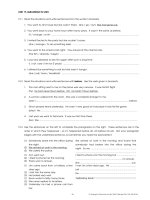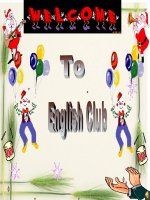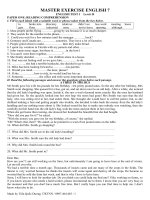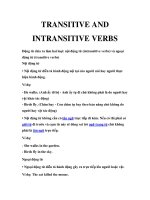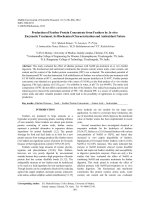TÀI LIỆU MÔN TIẾNG ANH
Bạn đang xem bản rút gọn của tài liệu. Xem và tải ngay bản đầy đủ của tài liệu tại đây (127.1 KB, 6 trang )
<span class='text_page_counter'>(1)</span><div class='page_container' data-page=1>
<b>ĐỀ CƯƠNG ÔN TẬP KIỂM TRA LẦN 3 UNIT 6,7</b>
<b>MÔN: TIẾNG ANH 9</b>
<b>NĂM HỌC: 2019 - 2020</b>
<b>A/ NGỮ PHÁP</b>
<b>I/ </b>
<b> Conditional sentences : ( Câu điều kiện)</b>
<b>1. Type 1- Câu điều kiện loại 1: điều kiện có thể xảy ra ở hiện tại hoặc tương lai</b>
<b>If clause</b> <b>Main clause</b>
<b>If + S + V / V s(es) + O</b> <b>S + will / can/ may + V+ O</b>
<b> (won’t / can’t + V)</b>
Ex: If I find her address, I will send her an invitation.
(Nếu tơi tìm thấy địa chỉ của cơ ấy thì tơi sẽ gửi cho cô ấy giấy mời)
If Mary doesn’t feel better tomorrow, she will see a doctor.
<b>Note: Một số biến thể: If + present continuous + simple future </b>
Ex: If you are staying for a week, we will get you a better room.
<b>2. Type 2 - Câu điều kiện loại 2: điều kiện khơng có thật ở hiện tại</b>
<b>If clause</b> <b>Main clause</b>
<b>If + S + V-ed / V2 + O</b>
<b>To be: were / weren’t</b>
<b>S + would / could + V + O</b>
<b> (wouldn’t / couldn’t + V)</b>
Ex: If I were you, I would tell the truth.( Nếu tơi là bạn thì tơi sẽ nói sự thật)
If she knew your address, she would send you a letter.
<b>II/ Adjectives and adverbs ( Tính từ và trạng từ)</b>
a- Tính từ - bổ nghĩa cho danh từ Ex: An interesting book
- Cách thành lập tính từ
+ Thêm tiếp đầu ngữ (prefix) vào trước động từ : a+verb adjective Ex: a+ live => alive
+ Thêm tiếp vị ngữ (suffix) : vào sau động từ và danh từ:
* Verb + ed adjective Ex: please + ed pleased (hài lòng)
* Noun + en adjective Ex: wood + en wooden ( bằng gỗ)
* Noun + ful / less adjective Ex: hope + ful hopeful (hy vọng)
* Noun + ly adjective Ex : love + ly lovely ( dễ thương)
* Noun + y adjective Ex: rain + y rainy (có mưa)
* Noun + ern <b> adjective</b> Ex: south + ern southern (thuộc miền Nam)
* Noun + ish <b> adjective</b> Ex: child + ish childish ( như con nít)
b - Trạng từ : bổ nghĩa cho động từ Ex: She sings well.
- Cách thành lập trạng từ :
+Hầu hết các trạng từ được thành lập bằng cách thêm “ ly” vào sau tính từ:
<b>adjective + ly adverb</b> Ex: slow + ly slowly
+ Một số các trạng từ đặc biệt: Ex: good well
fast; hard; early; late (vừa là tính từ, vừa là trạng từ)
<b>III/ Adjective+ that clause:</b>
<b>S + be + adjective/ past participle + that + noun clause</b>
Ex : I am happy that you had a new car.
Note: Thường đứng sau các tính từ như: : AFRAID, GLAD, SORRY, SURE, EAGER, ANXIOUS,
<b>HAPPY, PLEASE, ANNOYED, PROUD, . . . </b>
<b>IV/ Connectives: (Từ nối - liên từ)</b>
* AND (và) Dùng để nối hai từ hoặc hai mệnh đề có cùng gía trị
Ex: Lan likes cats and dogs.
</div>
<span class='text_page_counter'>(2)</span><div class='page_container' data-page=2>
* SO ; THEREFORE (vì thế, vì vậy): Dùng trong mệnh đề chỉ kết quả. Nó đứng trước mệnh đề mà nó
giới thiệu.
Ex: He’s ill , so he stays at home.
Ex: The weather was too bad; therefore, our plan had been changed.
* HOWEVER ( tuy nhiên)
Ex: I will offer my cat to Hoa; however, she may not like it.
* BECAUSE/ SINCE/ AS (bởi vì ) dùng để chỉ lý do
Ex: She didn’t go to the zoo because/ since/ as she was ill.
Note: Chúng ta có thể thay thế “because of” cho “ because/ since/ as”
<b>……..because + S + V</b> <b>………because of + noun (phrase)</b>
Ex: I was late because of the traffic jam. ( kẹt xe)
* OR ( hay, hoặc là)
Ex: Is your girl tall or short ?
<b>V/ Making suggestion: ( câu đề nghị) : Gồm nhiều hình thức:</b>
- “ Let’s/ Shall I/ Shall we + Vinf” diễn đạt lời đề nghị với ngôi thứ nhất
Ex:Let’s go to the zoo.
- “Why don’t we/ Why don’t you + Vinf” diễn đạt lời đề nghị với ngôi thứ nhất và ngôi thứ hai
- “ What about / How about + gerund / noun ?
- “suggest” or “propose”
- Suggest + Ving Ex: I suggest (your) forgetting him.
- Suggest that + S+ should + V Ex: I suggest that we should go to a seaside resort.
Ex: I propose that the receptionists wear uniform.
<b>VI/ Phrasal verbs: ( động từ kép)</b>
* To turn on/up/dowm/ off
* To come in/ over
* To wait for S.O what…for?: Chờ ai để làm gì
* To talk to sb about sth: Kể cho ai biết về điều gì
* To live on = depend on S.O : Phụ thuộc vào ai
* Look at/ after sb/ sth = take care of= care of: trơng nom, chăm sóc ....
<b>B/ BÀI TẬP</b>
<b>I/ Choose the correct answer A, B, C or D to complete each sentences. </b>
1. Can you turn ____ the light? It’s too dark.
A. on B. off C. in D. for
2. What are you looking _____? My picture book. I’ve lost it.
A. on B. off C. in D. for
3. What can we do to spend less ____ lighting?
A. in B. on C. about D. of
4. Is he an actor ____ a singer? An actor
A. and B. or C. with D. so
5. He was tired, ____ he took a rest before continuing the work
A. so B. and C. but D. if
6. I suggest ____ money for the poor people in our neighborhood
A. save B. saving C. to save D. saved
7. Who looks ____ your children when you are away from home?
A. for B. at C. after D. to
8. Why doesn’t she go ____ with her university study?
A. in B. at C. to D. on
9. After coming home, she cleaned the floor ____ cooked dinner
A. but B. however C. or D. and
</div>
<span class='text_page_counter'>(3)</span><div class='page_container' data-page=3>
A. but B. however C. or D. and
12. How about ________posters on energy saving and hanging them around our school?
A. make B. making C. to make D. to making
13. In order to save electricity, an ordinary 100-watt light bulb can be replaced by ______.
A. a 1000-watt light B. a lamp C. an electric bulb D. an energy-saving bulb
14. The children are playing _______ in the school yard.
A. happy B. happily C. happier D. happiness
15. Mrs. Hoa forgot to turn _______ the faucet when she left for work.
A. on B. up C. off D. over
16. _______ he gets up early, he won’t be late for school.
A. If B. Because C. Although D. so
17. We are talking about the preservation of _______resources.
A. natural B. naturally C. nature D. naturalize
18. Why don’t we _______ showers to save water?
A. taking B. to take C. take D. took
19. His hobbies are playing soccer _____ collecting stamps.
A. and B. but C. however D. although
20. I wear a hat ____ I don’t want to be sick.
A. because B. but C. therefore D. and
<b>II / Complete each sentence with a word from the list</b>
junk- yard ; necessities ; plumber ; treasure
enormous ; reduce ; stream ; consumer ; atmosphere
1. person who puts in and repairs water pipe, bath sinks. _______
2. a flow of water _______
3. to make something less. _______
4. very large, very great. _______
5. the air surrounding the Earth. _______
6. person who buy things or uses services . _______
7. valuable or precious things _______
8. A piece of land full of rubbish. _______
9. needs. _______
<b>III/ Fill in the blank with the correct form or tense of the verbs in brackets.</b>
1. My brother spent hours (repair)... his motorbike.
2. Don’t forget to bring my dictionary when you (come)... back tomorrow.
3.You (feel) ...cold if the sun (not shine)...
4. I’m very tired after a long walk. I’m not used to ……….(walk) so far.
5. Bill never carries money with him. He’s afraid of ………..(rob)
6. I stopped ………..(buy) a newspaper on the way home.
7. She dislikes ………..(ask) to do something by others.
8. If Lan or Mai ………..(come), tell them ………..(wait) for me.
9. When Mrs. Brown (look)... out, she(see)...the children (play)... near the pool.
10. A: Who suggested (go)... on a camping holiday in October?
<b>IV/ Word forms:</b>
1. The stream is (cover)... with foam.
2. Miss Black is a volunteer (conserve)...
3. If all the (pollute)...go on , what’s going to happen?
4. She was (cheer)... when she passed the exam.
5. The invironment is (extreme)... polluted.
6. We must drive (slow)... …………..on dangerous streets.
7. I was (disappoint) ... that you failed the exam.
</div>
<span class='text_page_counter'>(4)</span><div class='page_container' data-page=4>
10.Nam’s English is excellent. He speaks English _________________.(perfect)
11. He is one of the most famous ____________ in the world (environment)
12. The old man walked ____________ to the park (slow)
13. That’s ____________! I’m pleased that you work very hard (wonder)
14. There is a ____________ faucet in your kitchen (drip)
15. I’m very ____________ because they use electricity to catch fish (worry)
<b>V / Complete the sentences using “AND / BUT / SO / OR / BECAUSE”</b>
1. I like Mary very much ____________ I don’t like her brother
2. I’d like to live somewhere by the Mediterranean ____________ I love the Sun
3. We enjoy learning English ____________ we find it very difficult
4. I can’t go out tonight ____________ I am short of money
5. She went to the theater last night ____________ had a wonderful time
6. They can’t walk home ____________ it is very dark
7. Would you like to drink milk ____________ coffee?
8. It’s raining heavily, ____________ I can’t go out
9. He did the test well ____________ I did, too
10. His life was hard ____________ he studied very well
<b>VI/ Choose the word, which is pronounced differently from the others.</b>
1. A. theater B. teaching C. speaking D. reading
2. A. write B. wonderful C. world D. weekend
3. A. church B. children C. school D. change
4. A. plumber B. dump C. compulsory D. Consuming
5. A. talked B. watched C. lived D. stopped
6. A. knew B. blew C. grew D. flew
7. A. guesthouse B. you C. build D. reduce
8. A. national B. teenager C. natural D. animal
<b>VII/ READING:</b>
<b>A.</b>
<b> Read the following passage carefully. </b>
People use many sources of energy. Ancient people used only their arms, hands, and simple tools
until they discovered fire. Later, people learned to use the energy of the wind to sail ships. Then they
learned to use animals to do work. In the eighteenth and nineteenth centuries, people began to use
machines. The first machines used steam. They burned coal to heat water. The hot water turned into
steam, and the steam engine did the work. Later, people began to use the gasoline engine, and today
people are using nuclear energy.
Energy is one of the basic concepts, or ideas, of physics. It is the ability to do work. Without
energy we couldn’t live. We need energy to work, and scientists are always looking for new sources of
energy.
True or False.
<b>The statements</b> <b>True</b> <b>False</b>
1. Wind, steam, and gasoline are sources of energy.
2. People have never used nuclear energy.
3.Energy is the ability to do work.
4. Scientists aren’t interested in looking for new sources of energy.
<b>Answer the question </b>
1. Ancient people used only their arms, hands, and simple tools until they discovered fire, didn’t they?
...
2. What did first machines use?
……….………
3. What are today people using ?
……….………
4. Could we live without energy ?
</div>
<span class='text_page_counter'>(5)</span><div class='page_container' data-page=5>
<b>B/ Read the passage carefully:</b>
Electricity is the most common form of energy today. In the modern world,electricity is very
available at the touch of a switch. Electricity has many uses.The most common use of electricity is to
provide artificial lighting. In factories , electricity is used to light up the work place. It is also used to
operate air-conditioners, computers and many other machines. Electricity is also used to power many
appliances that we have in our homes such appliances include television sets, computers, electric fans,
irons and many others.The list is simply endless . Modern man will most probably be lost without
electricity .
<i><b>*Check True or False </b></i>
<b>The statements</b> <b>True</b> <b>False</b>
1. Electricity is the most popular source of energy today
2. In factories , electricity isn’t used to light up the work place
3. Modern man will probably depend on electricity
4.At our home we can use electrical appliances if there isn’t electricity
<b>* Answer the questions </b>
1. Is electricity the common form of energy nowadays?
……….
2. What is electricity also used to ?
……….………
3. Electricity isn’t very available at the touch of a switch, is it?
……….
4. What should we do to save eletricity at school ?
……….
<b>VIII/ Complete the sentence with the one word given below. One word can be used for more than </b>
<b>one sentence: for/ up/ after/ on/ off/ away/ in</b>
1. Who’s going to look ______ the children while you’re away?
2. “Turn ______ the TV for me, will you? I want to watch the cartoon.
3. She’s looked ______ her keys everywhere.
4. Turn ______ the radio. I’m working.
5. If we go ______ littering, the environment will become seriously polluted.
6. Don’t throw these newspapers ______.
7. Could you fill ______ this form?
8. Don’t wake the baby ______. Let him sleep.
9. Don’t believe her. She’s just made ______ the story.
10. Susan took ______ her coat and put it on the sofa.
<b>IX/ Rewrite the second sentence so that it has a similar meaning to the first.</b>
1. Your English doesn’t improve because you don’t practice it regularly. (if)
………
2. I’m trying to find my diary. (looking)
………
3. The last time I saw David was in 1989. (seen)
………
4. “Do you have any appointments?” said Martin. (whether)
………
5. “Let’s go to the swimming pool,” said Nick. (suggested)
………
6. I can’t play basketball because of my height.
Because I ...
7. He can’t meet you because of being busy.
Because ...
8. We can’t fly because the wether is bad.
</div>
<span class='text_page_counter'>(6)</span><div class='page_container' data-page=6>
9. It is raining, so we decide to postpone our trip.
Because ...
10. Nobody can do this test because of its difficult.
Because ...
11. Who owns this car?
Who does...?
12. How long have John and Mary been married?
When did... ...
<b>X/ Find and correct the mistakes:</b>
1.Electricity is also used to power the much appliances.
2.That man drives carefully so he has got an accident.
3.If you study hard you would be a good doctor.
4.You will get bad marks if you won’t be lazy.
5.If you are late to school, you won’t finish your test.
6.I suggest that you took part in our English class.
7.We suggest that the garbage should put on the garbage bins.
8. How about listen to music. That’s a good idea.
9. Because the bad weather, we couldn’t go camping.
10. Because of he is lazy, He always gets bad marks.
<b>XI. Rearrange into good sentences </b>
1.We/would/the flight/afraid/were/you/miss/that.
………..
2.How/about/ a shower/taking/ instead of/a bath /water/to save?
………..
3.would /if/you/be /go /school/better/to/bike/by/ It.
...
4.they /that/worried/I/was/back/come/wouldn’t .
...
5. I am / that / disapointed / have cut down / people / all these trees.
………...…
6. sing / My / songs / English / well./ classmate/ can/ very
………...…
7. I / hot / The weather / is / open / all the windows. / so
………...…
8. A dripping faucet / waste / 500 liters / can / of water / a month.
………...…
<b>XII. Combine these sentences using Adj + that clause : </b>
1. No one / sorry / our manager / resigned.
………
2. Everybody / not surprised / they / divorce.
………
3. I / disappointed / you / not / see / me / yesterday.
………
4. We / thankful / she / tell / truth.
………
5. Children / excited / go / zoo / last Sunday.
………
</div>
<!--links-->
